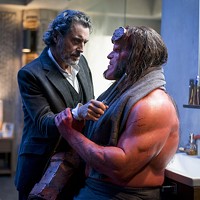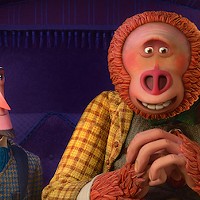

BIG FAN Robert D. Siegel, who wrote the original screenplay for last year's superb drama The Wrestler, now makes his directorial debut with a picture that shifts the spotlight from the sports arena to the stands. Big Fan's protagonist is Paul Aufiero (Patton Oswalt), who considers himself nothing less than the New York Giants' most ardent supporter ... ever. Now in his mid-30s, Paul is perfectly OK with living at home with his exasperated mother (Marcia Jean Kurtz), staying away from members of the opposite sex, and working a dead-end job as a parking attendant. Aside from the occasional masturbatory session under the sheets, his only pastimes are watching Giants games with his friend Sal (Kevin Corrigan) and religiously calling into a nightly sports-radio station to offer opinions which he's scrupulously scripted ahead of time. All runs smoothly in Paul's insulated bubble until the night he spots his favorite Giant, linebacker Quantrell Bishop (Jonathan Hamm), and gets up the nerve to talk to him. The encounter lands Paul in the hospital and Quantrell on the NFL's suspension list, but Paul ultimately isn't too worried about his own well-being; more importantly, he wonders how this distracting incident will affect the rest of the Giants' season. The cult of organized sports often requires many sacrifices from its diehard devotees – of time (for starters, that Fantasy Football can sure eat up weekends!), money, even family. Siegel's picture takes it to the extreme, examining the outer reaches of this particular mode of hero worship and the psychological impact of sacrificing one's entire life to something that yields limited dividends. Big Fan stretches credulity in spots, but for the most part, it manages to keep its eye on the ball. ***
BRIGHT STAR Commencing in 1818 London, the story of Bright Star, with its key events based in fact but its smaller ones colored in by writer-director Jane Campion's poetic license, takes place over the course of a couple of years, as the forward and fashion-conscious Fanny (Abbie Cornish) makes the acquaintance of two English poets trying to build names for themselves. One is Charles Brown (Asheville native Paul Schneider), who views Fanny as no more than a bubble-headed flirt and frequently engages her in vicious verbal combat (she holds her own quite nicely, thank you). The other is John Keats (Ben Whishaw), who's initially preoccupied with tending to his dying brother but in time falls for the lovely Fanny. She's equally smitten, but since he's penniless and since the women of the day were expected to set their sights on men with money, their love seems doomed – even before he develops that bothersome cough. Bringing the creative process to life on screen is always an uphill battle – how does one turn thoughts into something tangible? – but Campion uses the characters' dialogue to provide reasonably sturdy stepping stones into often abstract territory. Fanny's strong desire to learn about poetry – to understand it, to appreciate it – stirs our own interest (perhaps buried since college!), and Keats responds with an absolutely lovely speech comparing poetry to a dive in the lake. A similar respect for the craft remains on view throughout the picture, thereby never reducing the art to a mere plot device but rather constantly working it into the very fabric of the film. Campion has made several films over the past 16 years, but all have been disappointments in the wake of her 1993 masterpiece The Piano. Bright Star isn't in the same ballpark as The Piano – heck, it's not even in the same time zone – but it's the first Campion movie since then to warrant 10 Best consideration. It's that special. ***1/2
CAPITALISM: A LOVE STORY It goes without saying that Michael Moore's latest documentary, Capitalism: A Love Story, hardly shows the United States of America at its best. The sobering afterthought is that it hardly shows Michael Moore at his best, either. Easily the controversial filmmaker's weakest nonfiction piece to date, Capitalism contains many powerful sequences yet ultimately is too scattershot to serve as effective agitprop. Tackling the subject of capitalism is even more daunting than tackling the subject of health care (as he did so expertly in Sicko), and Moore is unable to coalesce all the different chapters of his odyssey into a cohesive whole. He jumps all over the place: watching ordinary folks being thrown out of their lifelong homes by the evil banking industry; chatting with erudite actor-playwright Wallace Shawn about economics; detailing how various people (including a judge) were getting rich by throwing typical teens into a juvenile detention center for offenses as minor as hurling a piece of meat across the dinner table; and noting how many banking-industry officials have been a key part of the past few administrations. This is all well and good, but we already knew most of these stories from even just cursory glances at newspapers and news blogs, and more than ever, we get the sense that Moore is preaching to the choir with no real inclination to expand his audience. As always, he's at his best when he gets the hell out of the way and lets average citizens have their say; these are the moments that alternately provide the most inspiration and the most outrage. By the end of the picture, Moore takes to the streets, brandishing the verbal equivalent of a shotgun and calling for the end of capitalism. Yet even his own footage often suggests that the problem isn't capitalism itself but rather capitalism as it's abused by those in charge. Moore means well, but in this case, he seems to have used that metaphorical shotgun to shoot himself in the foot. **1/2


